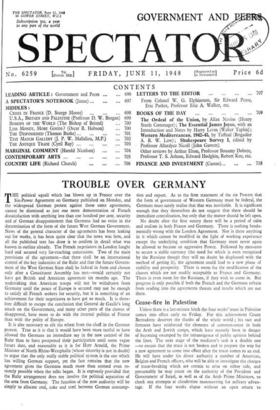TROUBLE OVER GERMANY
THE political squall which has blown up in France over the Six-Power Agreement on Germany published on Monday, and the widespread German protest against those same agreements, cannot be dismissed as just one more demonstration of French dissatisfaction with anything less than one hundred per cent. security and of German disappointment that Germans had no voice in the determination of the form of the future West German Government. News of the general character of the agreements has been leaking out for weeks, it has been quite clear that the news was firm, and all the published text has done is to confirm in detail what was known in outline already. The French negotiators in London fought hard and secured very far-reaching concessions. Two of the main provisions of the agreement—that there shall be an international control of the key industries of the Ruhr and that the future Govern- ment of the West German State shall be federal in form and chosen only after a Constituent Assembly has met--would certainly not have got British and American agreement Six months ago. The undertaking that American troops will not be withdrawn from Germany until the peace of Europe is secured may not be enough to satisfy all French seekers for security, but it is. something of an achievement for their negotiators to have got so much. It is there- fore difficult to escape the conclusion that General de Gaulle's long attack on the Government, and many other parts of the chorus of disapproval, have more to do with the internal politics of France than with the polity of Europe.
It is also necessary to sift the wheat from the chaff in the German protest. True as it is that it would have been more tactful to have allowed the Germans an immediate say in the new control of the Ruhr than to have postponed their• participation until some vague future date, and reasonable as it is for Her• Arnold, the Prime Minister of North Rhine-Westphalia (whose sincerity is not in doubt) to argue that the only really stable political system is the one which has willing German support, yet the fact remains that the new agreement gives the Germans much more than seemed even re- motely possible when the talks began. It is expressly provided that the Ruhr arrangement does not involve the political separation of the area from Germany. The function of the new authority will be simply to allocate coal, coke and steel between German consump-
tion and export. As to the firm statement of the six Powers that the form of government of Western Germany must be federal, the Germans must surely realise that that was inevitable. It is significant enough that they themselves do not suggest that there should be immediate centralisation, but only that the matter should be left open.
No doubt after the first outcry there will be a period of calm and realism in both France and Germany. There is nothing funda- mentally wrong with the London Agreement. Nor is there anything in it which cannot be modified in the light of working experience except the underlying condition that Germany must never again be allowed to become an aggressive Power. Followed by measures to secure a stable currency (the need for which is even recognised by the Russians though they will no doubt be displeased with the method of getting it), the agreement could lead to a new phase of stability and prosperity. There is room for the modification of the clauses which are not readily acceptable to France and Germany. There is even room for the Russians, if they wish to come in. But progress is only possible if both the French and the Germans refrain from reading into the agreements threats and insults which are not there.






























